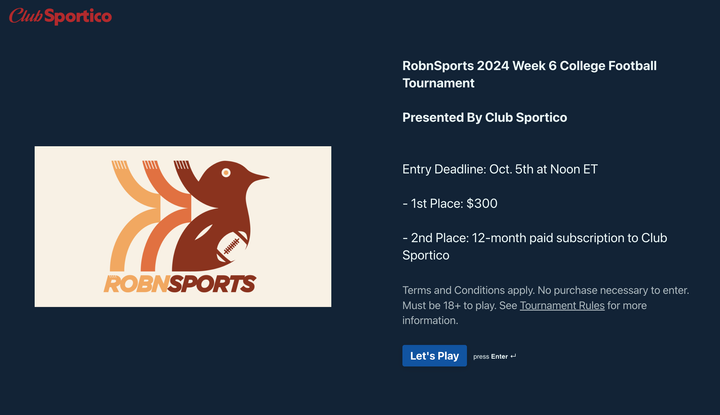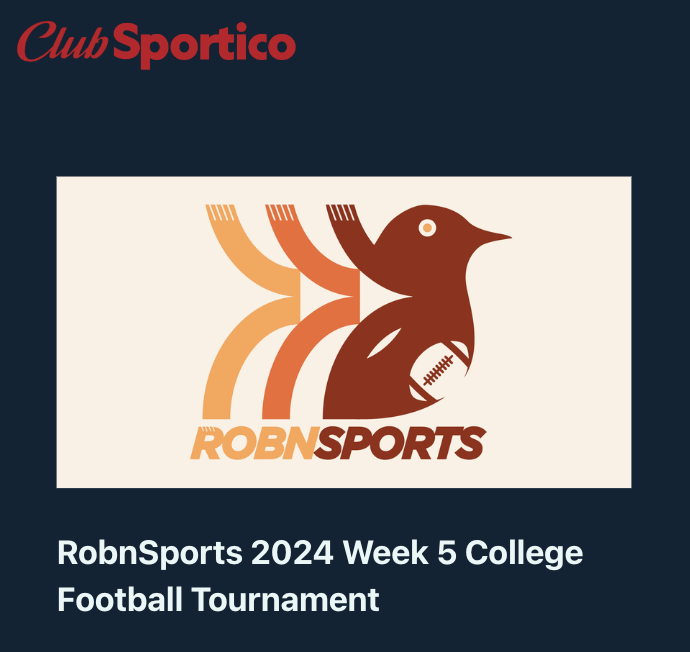The Week 3 CFB Tournament -- Responses, Live Leaderboard
How do fans of the Sport consume games differently than fans of a Team? How does NIL off the field contribute to a player's recognizability on the field? Is there a single truly compelling game this Saturday? We unfurl the Robn Week 3 College Football Tournament, presented by Rotowire.
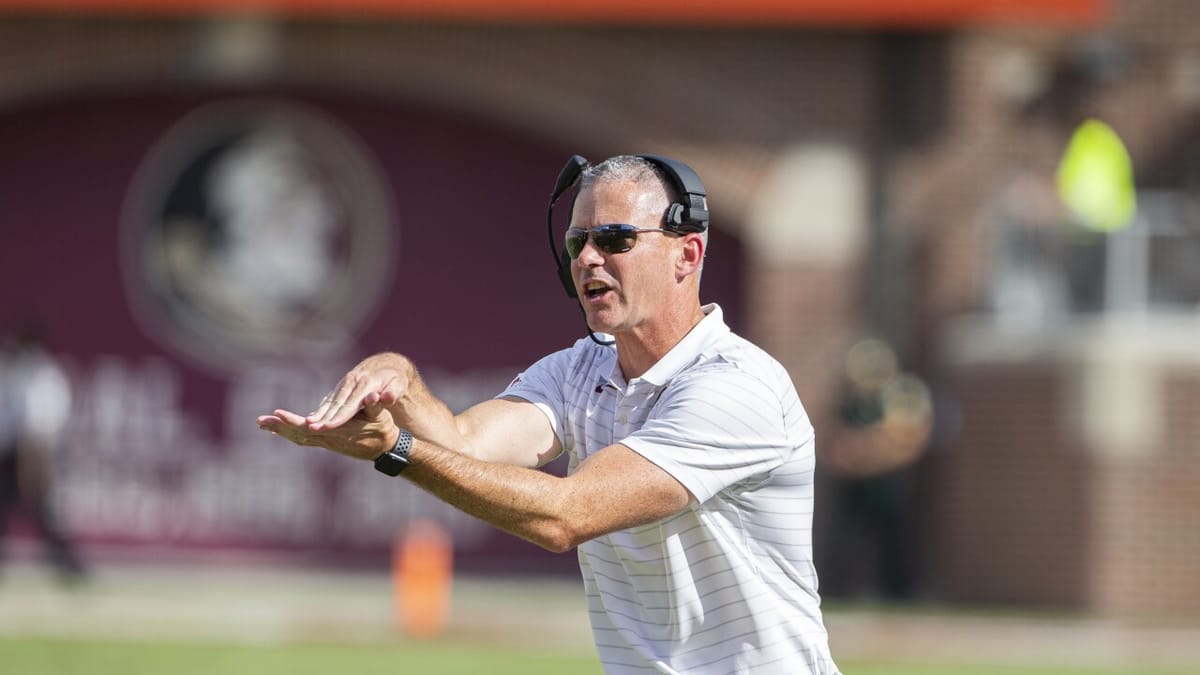
Week 3 Results
Seasonlong Standings
Fans Of A Sport Vs. Fans Of A Team
We've got two weeks of the season under our belt, but are still reactivating the eight-months-underutilized muscles of the Saturday viewing routine.
These muscles are the ones fans use to play Jenga with rival blocks of weekend intrigue and obligation, fitting each into windows of time.
What game do we have the main screen on? What's on the laptop? What's cooking in the group text? Did I ever make that bet I thought of back on Tuesday? Whom do I need to harass because their team did something/is about to do something stupid? When am I squeezing in the weekend chores and errands? Is this the weekend my wife told our friends we'd do something with them for fours hours in the late afternoon? Is my wife even still speaking to me?
Above all: How are each of today's 60+ games are going to turn out?
I call this bird's eye view of each individual Saturday slate The Map of the Unknown. My admiration for it contributed to the construction of a game that factors in much of the gamut of a weekend's action, and moves away from rewarding the naked exercise of "picking" your favorite team to win by a certain margin each week (which, of course, constitutes you telegraphing you want to happen, not what you think will happen).
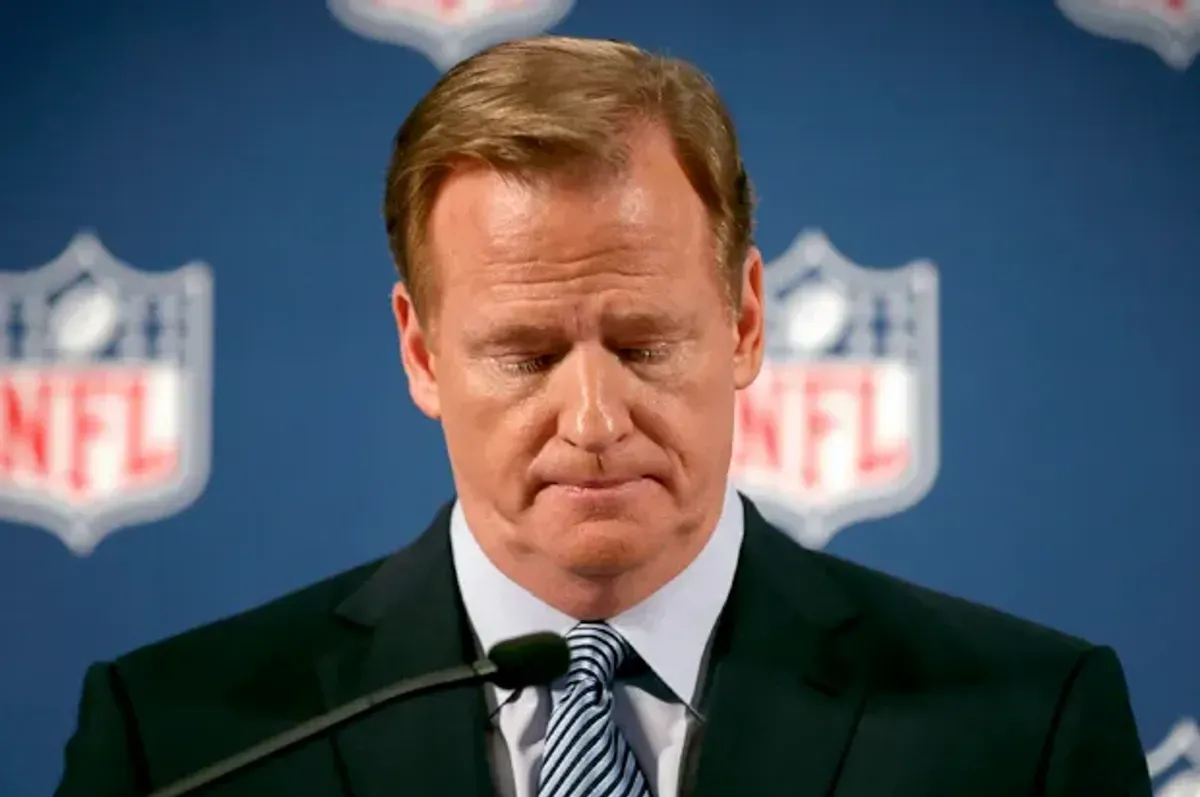
The Map of the Unknown on a given Saturday thereby contains greater excitement for, and greater applicability to, College Football Fans™ and not fans of a single team. If I'm a Wisconsin fan, my day is centered around when the Badgers are playing, who they're playing, where I'm watching the game, who I'm talking to during the game, etc. I consume media coverage through the lens of that fandom: what are people saying that could potentially be construed to be about, or affect, or not sufficiently recognize, my team. I am the person who goes to the restaurant for a single, familiar entree, because I love that the type of food that dish features and want to experience that food.
If I'm a College Football Fan, I go to the restaurant for the 12-course chef's tasting and don't look at the menu, because I love the restaurant and want to experience a panoply.
Being a fan of the sport as a whole is a vulnerable position to be in. Team fanbases still foment (an albeit often deranged) community. They erect the psychological fenceposts that hem in comforting ideas of good (our players are good guys) and bad (criticisms of my team are biased and unfounded). Teams are easy to visibly align oneself with – you can signal to others that you're with a team by wearing a shirt or a hat, you can go to a game, you can donate to the team's collective. For some, the illusion exists that a team will love them back.
College Football Fans lack these same symbols and signposts, and so is diffuse and much more lacking in terms of community. The closest thing they have to arbitrary good and bad is if someone condescends to college football in favor of the NFL. There is no vanity license plate or wall pennant for "College Football" by which you can signal your support. The sport does not love you back, particularly if it's in the middle of changing into something increasingly unrecognizable.
One "unrecognizable" aspect, discussed on this week's RobnPod, is the College Football Fan's lack of familiarity with who comprises what teams. This is due to exponentially increased player movement as talent and NIL money chase each other each offseason in a never-ending spiral. Some 38,000 Division I college football and basketball players, and some 350 schools, re-enacting every year en masse the style and volatility of John Calipari 2010s roster construction does not bother me. This is an inconvenience to the fan that arises out of players having more freedom from year to year to seek the playing time, coaching or academic situation, or financial incentives that they desire.

In addition to using players names in the creation of the blockbuster sensation of the Summer, the College Football 25 video game, EA Sports utilized AI and facial recognition technology to comb through millions of photos of players online and re-create their corporeal "likeness" on the screen in a matter of weeks. This was meant, as so many things with AI are, to leverage technology for the sake of convenience and streamline the task of making 30,000 digital avatars resemble their real-life counterparts. But its use is as symbolic (we will write much more about AI in the coming weeks) as it is functional.
Traditionally, non-Heisman-candidate college football players' identities were largely determined by the team they played for. Oh, Renfrow? He's the wide receiver for Clemson. As more money flows into the sport and more players become visibly attached to endorsements, it is likely that more players will foster recognizable visual identities based in their own literal likeness, not the team/s for which they play. Theoretically, fans of both types should be able to recognize more 19-year-old athletes just based on seeing the 19-year-old athlete in street clothes. In other words, players are now brands.
For those of us who are College Football Fans, I wonder how the increasing likelihood of recognizing and characterizing the individual will affect viewing habits on Saturdays, particularly when game slates aren't that compelling. In the absence of great team matchups will we focus more on great player matchups? Will we start interpreting the results of a Saturday more through the lens of what affects the individual player and their brand, and not just how teams are impacted?
The Map of the Unknown this week appears noticeably barren. There are few compelling matchups, made worse for our purposes by putting one of the few good ones, Kansas State-Arizona, on Friday night and thus making it ineligible for this week's Tournament.
Just how light is the Chef's Tasting Menu in Week 3? Well...
What Are The Least-Bad Dishes On The Menu In Week 3?
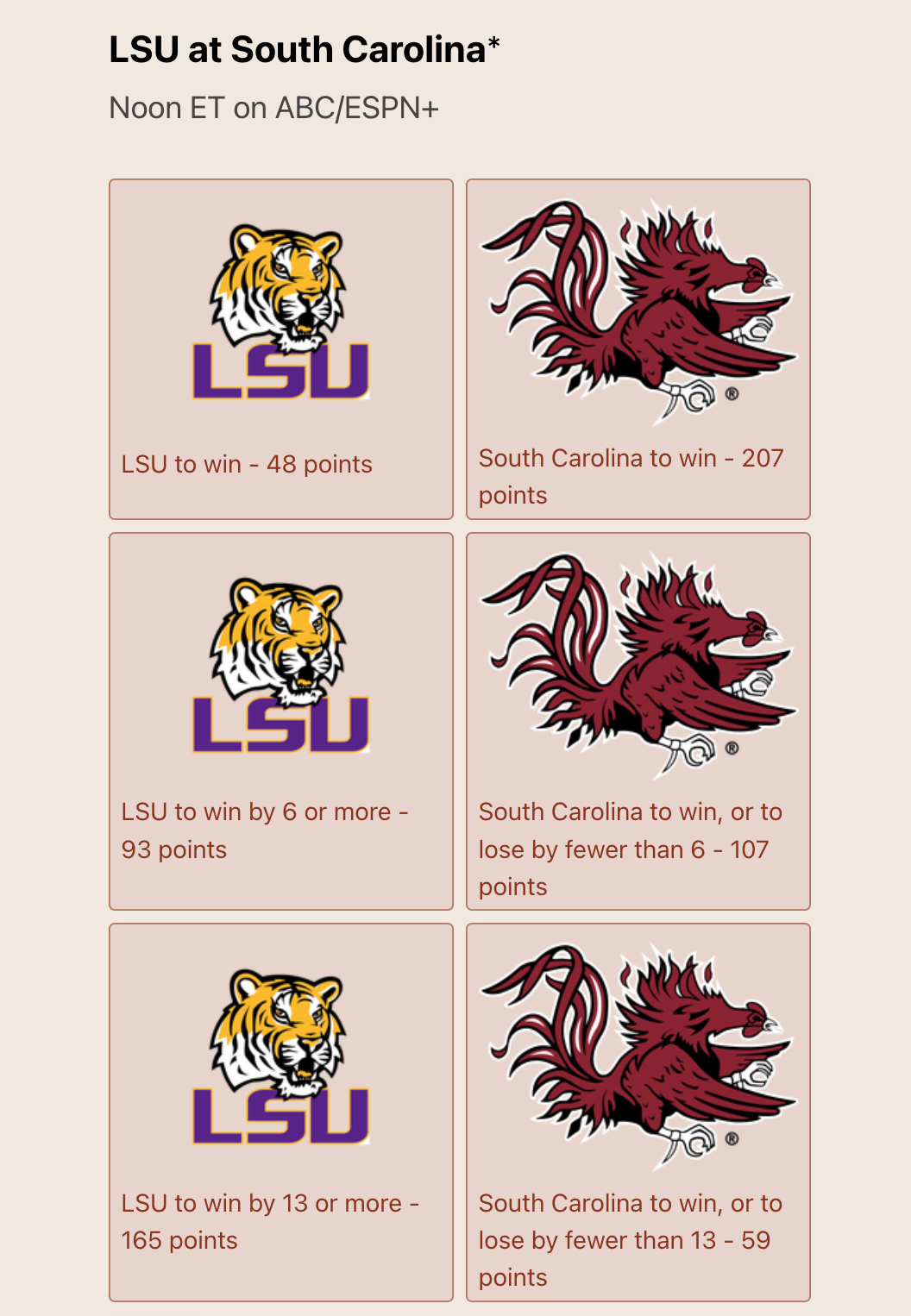
This is the GameDay game. That tells you all you need to know about Week 3 and, cynics would say, about ESPN.
South Carolina's strength is its defensive front, particularly off the edge. They shut down Kentucky's offense last week entirely. In spite of Kentucky losing RB Ray Davis and QB Devin Leary, this should mean something, as the Wildcats' offensive and defensive lines were supposed to be their best in years.
This really seems like a "pace" game: If LSU can come out early and get vertical and get points, the latter of which they didn't do versus USC, they could put this game away. Conversely, if South Carolina controls the pace of the game by slowing the game down via the run, and getting pressure with its front seven, the Gamecocks could be in a position to win.
If LSU intends on competing for a playoff spot, it needs to win this game convincingly. They are only favored by a touchdown.
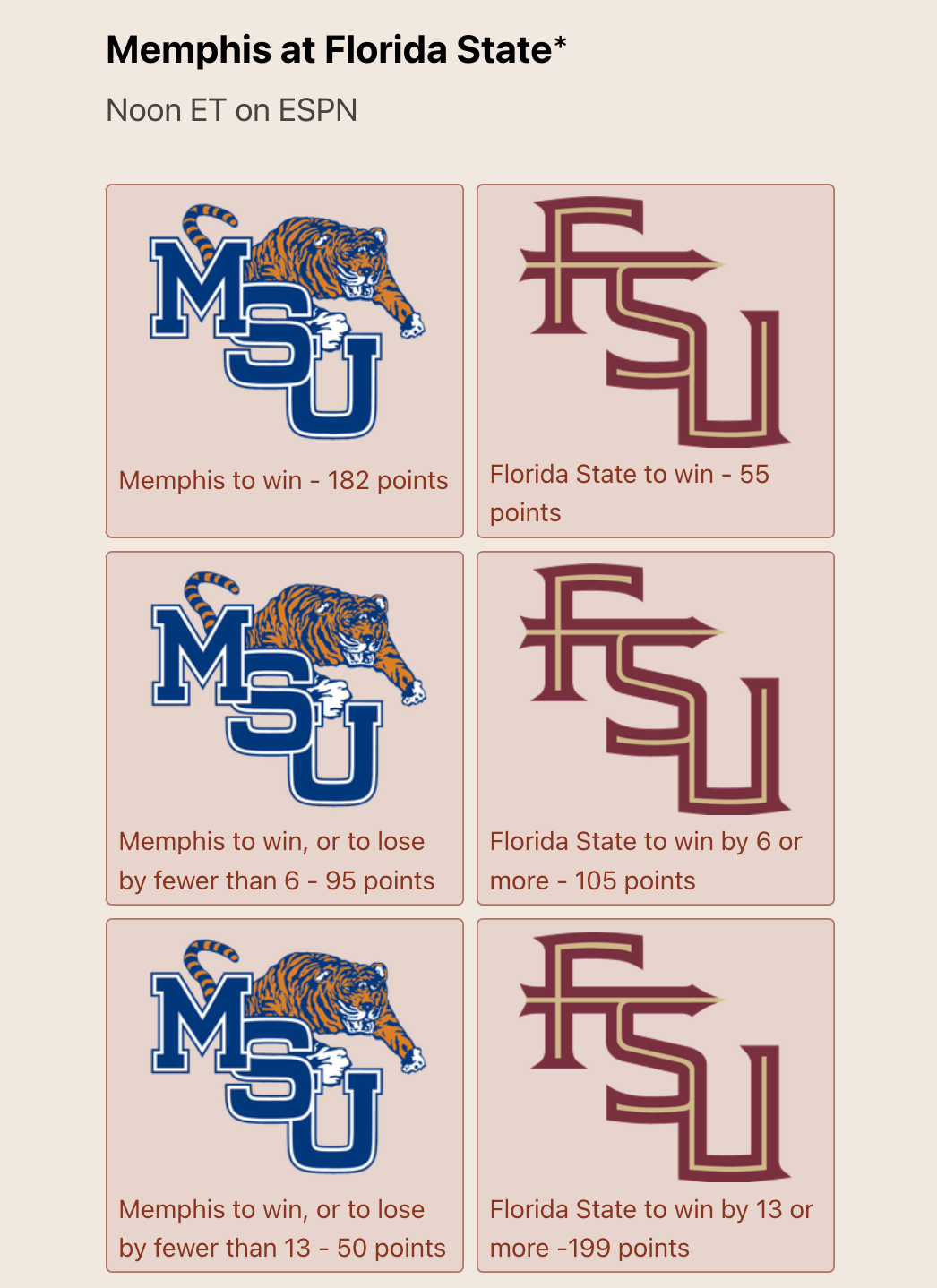
If you're a fan of a sport and not of a team, you theoretically feel no joy or anger when something goes horribly wrong for someone else. You can just sit back and watch greatness happen. You can sit back and watch car crashes happen. To any team.
Florida State thus far is this year's version of the car crash.
As such, Memphis could be FIU or Kent State and it would be coming into this game with a little buzz. But Memphis has a Top Ten offense, and as such, is an extremely trendy pick. Lots of scoring threats, plus an embarrassed opponent? How could this not work!?
Beware of trendiness. One angle of note: Will Memphis try to attack Florida State where its now-exposed vulnerabilities are (the lines) with smash-mouth football and ironically, in so doing, get away from its bread and butter: a spread offense that flies around in space? Will Florida State play like it cares?
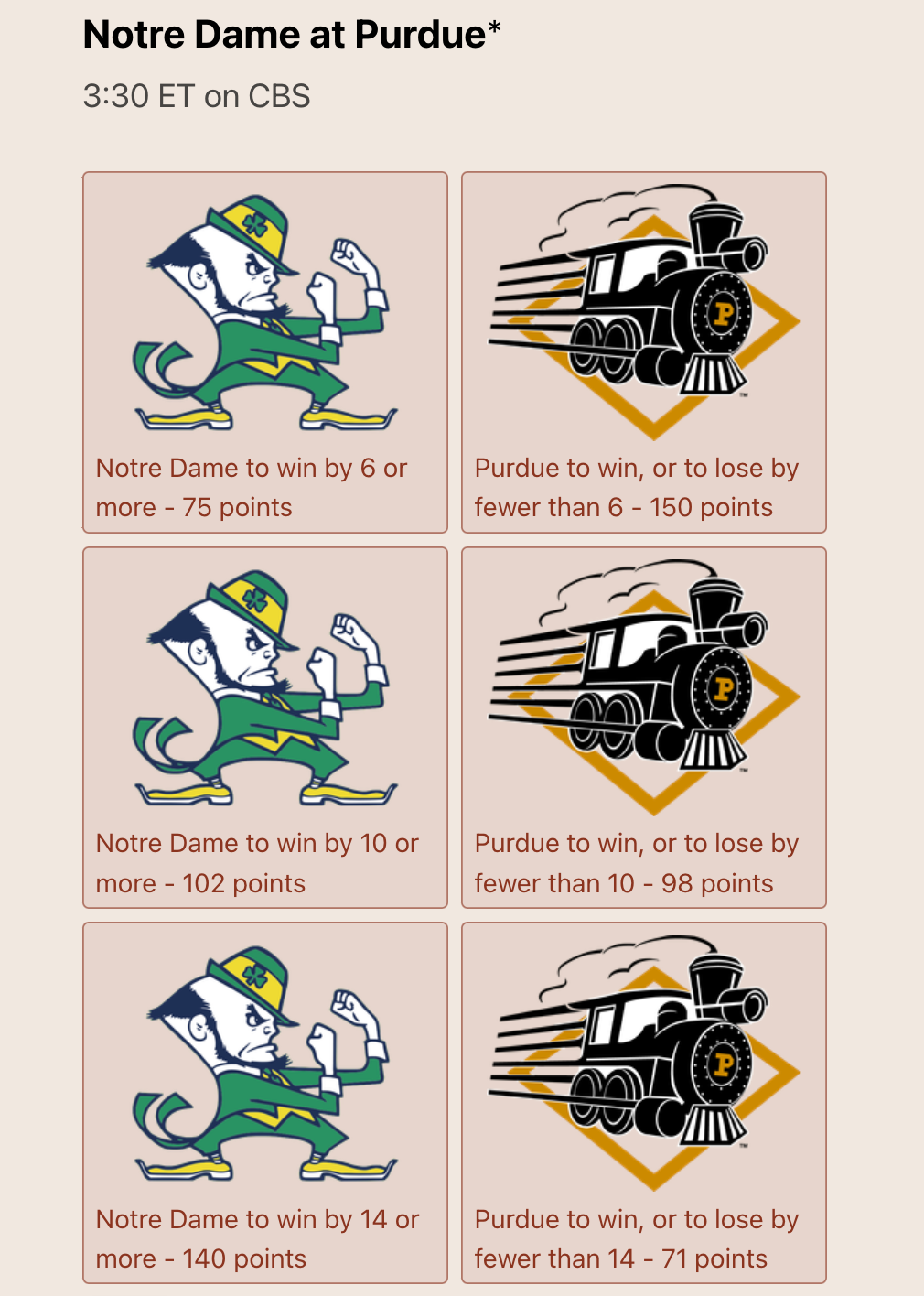
2022 Notre Dame Schedule:
Week 1: 5th-ranked Irish lost respectably on the road at Top 2 Ohio State 21-10. Defense showed out. Won trench battles.
Week 2: Lost to G5 opponent Marshall at home 26-21 as a 21-point favorite. Everyone's shocked.
Week 3: Beat low P5 opponent Cal 24-17 at home as a 14-point favorite.
2024 Notre Dame Schedule:
Week 1: 7th-ranked Irish won respectably on the road at Top 20 Texas A&M 23-13. Defense showed out. Won trench battles.
Week 2: Lost to G5 opponent Northern Illinois at home 16-14 as a 28.5-point favorite. Everyone's shocked.
Week 3: Faces low P5 opponent Purdue on the road as a 10-point favorite.
We don't know anything about Purdue, yet. This game is about whether Notre Dame decides to stick to the same old script of "Ooh!... Meh..."
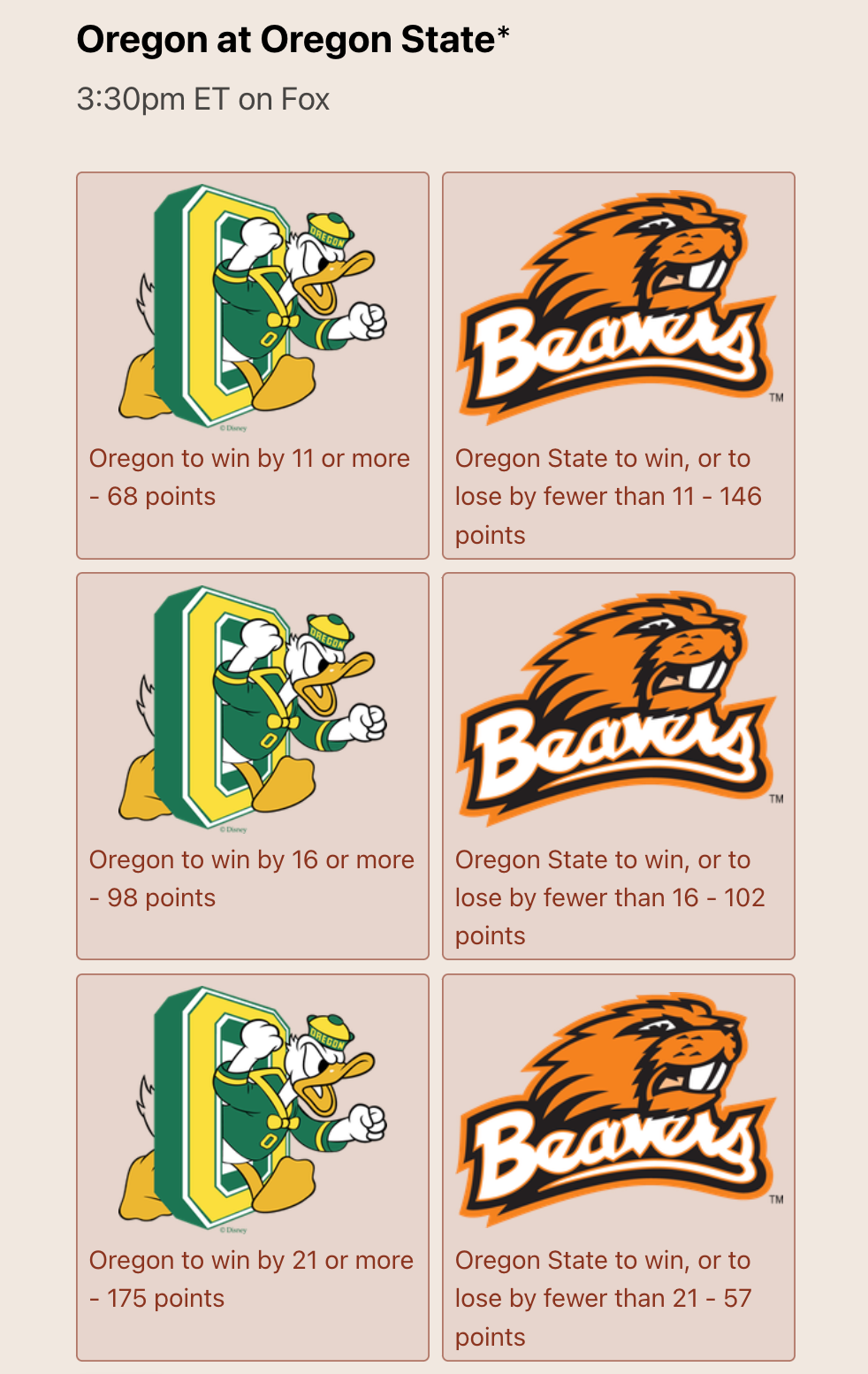
Oregon is either not an elite team, or they are elite but they're not all right, internally. Perhaps there is one answer for the offense and another for the defense.
Either way, it's entirely plausible that Oregon State keeps this close. This game is Corvallis, the importance of which I can't overstate. I just don't how it will be important.
The environment is always rabid for the Civil War, with chain saws and the like, and this is of course the first heated rivalry game they've played out of conference. Dan Lanning however seems to come up better in bigger moments – facing Boise State at home on Peacock when the east coast is asleep is not one of them. Getting right versus your hated, self-styled Little Brother, is.
We still have to remind ourselves that we don't know Oregon State, yet. Their entire team seemed to leave last season in re Pac-2. Is a 21-0 victory over San Diego State good? Is beating Idaho State by a wider margin than Oregon beat Idaho good?
If Oregon State wins, or even keeps it tight, the Ducks will be haunted by the state of Idaho for the third-straight week: Beavers QB Gevani McCoy (16-26 for 181, 1 TD, 0 Int last week) is a transfer from the University of Idaho.



